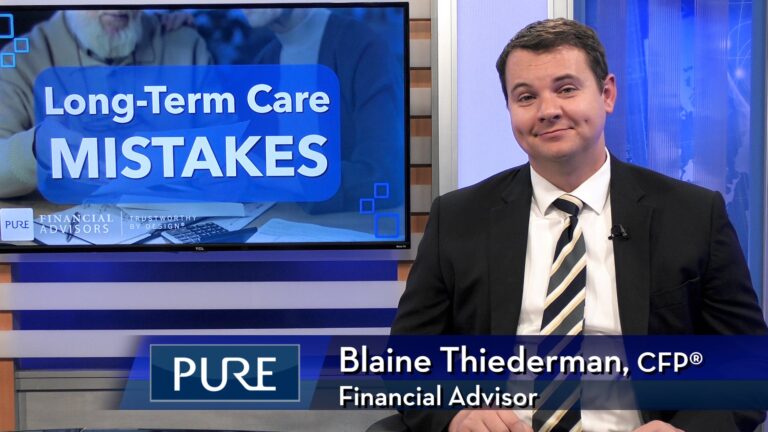Employee Stock Purchase Plans (ESPPs) allow employees to buy company stock at a discount, fostering ownership and aligning interests with company performance. Pure’s Financial Advisor, Ian Barr, CFP®, helps you understand ESPPs’ mechanics, benefits, and key considerations so employees can maximize this benefit and manage their financial well-being.
You will learn:
- Company stock discounts
- Tax implications
- ESPP benefits
- Employee considerations
FREE GUIDE | Retirement Readiness Guide
Transcript
ESPPs are a popular employee benefit offered by many companies as a way to allow employees to purchase company stock to through payroll deductions, often at a discount from the market price. These plans are a way to provide employees with sense of ownership and align their interests with the company’s performance over time. Today I’ll go over how they work, some benefits, and important considerations for employees looking to participate in these plans.
Employees eligible to participate in an ESPP can typically choose to enroll during specific windows called enrollment periods. Once enrolled, their employer sets aside payroll deductions to contribute funds towards the purchase of company stock in what’s called the offering period. During the offering period, payroll deductions accumulate until the end of the period and that time the proceeds are used to purchase company stock on behalf of participating employees. The purchase price is often set by the company at a discount from the fair market value of the stock on the day of purchase, thus providing employees with an immediate gain in the value of their shares.
Company Stock Discounts and Tax Implications
The discount offered on purchase price can vary but is often capped by tax regulations. The discount is a key benefit of ESPPs and can range from 5% to 15% off the market price of the stock. The discount received on the purchase price of the stock is typically considered ordinary income and is subject to ordinary income tax. Additionally, any gains realized when the stock is sold may be subject to capital gains tax, and that tax can vary depending on how long you held the stock before you sold it.
ESPP Benefits
So, you can begin to see how these Employee Stock Purchase Plans can benefit employees. They give employees the opportunity to purchase company stock at a discounted price, allowing them to potentially profit from the difference between the purchase price and the market value of the stock.
ESPPs facilitate automatic payroll deductions, which make it convenient for employees to save and invest in company stock without having to actively manage their investments. And there’s a potential for growth, if the company’s stock price increases over time, employees may benefit from capital appreciation on their ESPP investments, further enhancing their financial picture.
Employee Considerations
ESPPs can be a valuable employee benefit, it’s essential for participants to consider diversification and avoid overexposure to their company’s stock. Holding a significant portion of wealth in a single stock can increase risk, and each person should evaluate their overall goals and objectives. Employees should be aware of the tax implications associated with ESPPs, including the treatment of the discount received on the purchase price and any capital gains realized upon the sale of the stock. It is important to understand your potential tax obligations so you can optimize your tax strategy. Like any investment in the stock market, the value of company stock purchased through an ESPP can fluctuate with market conditions. Employees should be prepared for the possibility of volatility and consider their risk tolerance when participating in an ESPP.
In conclusion, Employee Stock Purchase Plans offer employees a valuable opportunity to purchase company stock at a discounted price, thus fostering a sense of ownership and alignment with the company’s performance. By understanding how ESPPs work, their benefits, and important considerations for participation, employees can make informed decisions to maximize the value of this employee benefit while effectively managing their financial well-being. If you would like professional advice about how to incorporate your company’s ESPP into your overall retirement plan, please take advantage of our free financial assessment.
Subscribe to our YouTube channel.
IMPORTANT DISCLOSURES:
• Investment Advisory and Financial Planning Services are offered through Pure Financial Advisors, LLC, a Registered Investment Advisor.
• Pure Financial Advisors LLC does not offer tax or legal advice. Consult with your tax advisor or attorney regarding specific situations.
• Opinions expressed are subject to change without notice and are not intended as investment advice or to predict future performance.
• Investing involves risk including the potential loss of principal. No investment strategy can guarantee a profit or protect against loss in periods of declining values.
• All information is believed to be from reliable sources; however, we make no representation as to its completeness or accuracy.
• Intended for educational purposes only and are not intended as individualized advice or a guarantee that you will achieve a desired result. Before implementing any strategies discussed you should consult your tax and financial advisors.
CFP® – The CERTIFIED FINANCIAL PLANNER™ certification is by the Certified Financial Planner Board of Standards, Inc. To attain the right to use the CFP® designation, an individual must satisfactorily fulfill education, experience and ethics requirements as well as pass a comprehensive exam. Thirty hours of continuing education is required every two years to maintain the designation.












